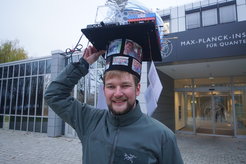Thomas Gantner brings science a little closer to the Bose-Einstein-condensate of polyatomic molecules
Thomas Gantner joined the MPQ as an undergraduate student assistant. Eight years later, he has successfully completed his PhD and moved on to new adventures.

Thomas’s doctoral research focuses on cold, dense and slow samples of polyatomic molecules for collision experiments. First, molecules were cooled in a cryogenic buffer gas cell and the resulting molecule beam was decelerated by a so-called "cryofuge". The subsequent density of the molecules was so high that it was possible to study collisions between cold polyatomic molecules. The principle of cooling and deceleration works for many different molecules as it depends on the electric dipole moment of the molecules. Thomas’ research is therefore an important step towards "cold chemistry" where chemical reactions can be controlled at extremely low temperatures. In a next step, Thomas contained the cold and slow molecules in a micro-structured, electrostatic trap for several seconds - with this, he has helped science come closer to the big idea of a Bose-Einstein condensate of polyatomic molecules.
What’s next?
For nearly two years, Thomas Gantner has been working in the development department at Scanlab where he develops galvanometer scanners that can redirect laser beams at high speeds and precision. These scanners are used in various industries, e.g. 3D laser sintering, laser beam welding and display production. However, not that much has changed for him since his time at MPQ, says Thomas Gantner: “both at MPQ and at his new job there are always new and challenging problems to solve.”
Congratulations and all the best for your new adventures ahead!












